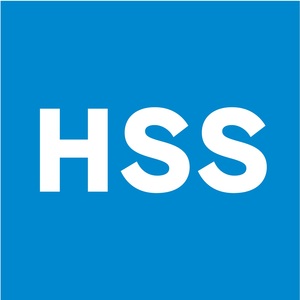NEW YORK, May 7, 2018 /PRNewswire-USNewswire/ -- Researchers at Hospital for Special Surgery (HSS) have launched a pilot study to see how a drug that treats several related autoimmune disorders affects the skeleton.
The two-year study, led by Susan M. Goodman, MD, a rheumatologist at HSS in New York City, will look at the effect on bone of secukinumab in men and women with ankylosing spondylitis (AS). Patients with AS, the prototypical form of spondyloarthritis (SpA), develop abnormal bone spurs called syndesmophytes. These growths can fuse vertebrae together, leading to loss of motion, pain and stiffness in the spine.
Despite the overactive growth of bone, people with SpA often suffer from osteoporosis, a condition marked by fragile skeletons vulnerable to fracture. Studies have estimated the prevalence of the bone disorder at as high as 25 percent for these patients, more than double the 10 percent prevalence in the general population. Osteoporosis and low bone mass affect an estimated 44 million men and women in the United States, according to the International Osteoporosis Foundation.
The reason for the paradox: Although these patients produce more of one type of bone, called cortical bone, which makes up the outside of the skeleton, the interior or trabecular bone is abnormally weak, said Dr. Goodman. As a result, their spines gradually become prone to small fractures that can lead to crippling changes in posture and significant pain and discomfort.
Although patients with AS and related disorders can take medication, such as bisphosphonates, calcium and vitamin D, to prevent fractures, they typically do not respond well to these therapies—and not as well as people with other autoimmune diseases, Dr. Goodman said. "Those drugs don't seem to be as helpful as you'd think they would be in this population of patients," she said.
Secukinumab belongs to a new class of monoclonal antibodies to treat autoimmune diseases. The FDA approved the drug in 2015 for adult patients with moderate to severe plaque psoriasis, and in 2016 it expanded that approval for adult patients to include AS and psoriatic arthritis. The drug specifically targets an immune protein called interleukin-17A (IL-17A). Anti-IL17 antibodies may protect against bone loss in two ways: by suppressing the function of bone-resorbing cells called osteoclasts, and promoting the activity of bone-forming cells called osteoblasts.
"It's very important to get a better understanding in a practical way of the effect of these drugs on bone metabolism. This study should really help us understand how they work," Dr. Goodman said.
Dr. Goodman's group will look at the effects on bone health of secukinumab in 20 men and women over the age of 18 with SpA. Volunteers will undergo a variety of regular assessments, including x-ray imaging of the skeleton to measure bone density and scoring of the spine for presence of spurs or erosions and tracking. Participants will also undergo periodic testing for various markers of bone growth and resorption, as well as levels of inflammation.
The study, "The Effects of Secukinumab on Bone Health and Metabolism," is now enrolling patients. Dr. Goodman said the project should take two years to complete, after which the researchers will spend another year or two analyzing their data. The group hopes to release preliminary findings periodically throughout the study period. Novartis is providing funding for the research.
For more information about the study, contact HSS clinical research manager Carey Ford at [email protected].
About HSS | Hospital for Special Surgery:
HSS is the world's leading academic medical center focused on musculoskeletal health. At its core is Hospital for Special Surgery, nationally ranked No. 1 in orthopedics (for the eighth consecutive year) and No. 3 in rheumatology by U.S. News & World Report (2017-2018). Founded in 1863, the Hospital has one of the lowest infection rates in the country and was the first in New York State to receive Magnet Recognition for Excellence in Nursing Service from the American Nurses Credentialing Center four consecutive times. An affiliate of Weill Cornell Medical College, HSS has a main campus in New York City and facilities in New Jersey, Connecticut and in the Long Island and Westchester County regions of New York State. In 2017 HSS provided care to 135,000 patients from 80 countries and performed more than 32,000 surgical procedures. In addition to patient care, HSS leads the field in research, innovation and education. The HSS Research Institute comprises 20 laboratories and 300 staff members focused on leading the advancement of musculoskeletal health through prevention of degeneration, tissue repair and tissue regeneration. The HSS Innovation Institute was formed in 2015 to realize the potential of new drugs, therapeutics and devices; the global standard total knee replacement was developed at HSS in 1969, and in 2017 HSS made 130 invention submissions (more than 2x the submissions in 2015). The HSS Education Institute provides continuing medical curriculum to more than 15,000 subscribing musculoskeletal healthcare professionals in 110 countries. Through HSS Global, the institution is collaborating with medical centers worldwide to advance the quality and value of care and to make world-class HSS care more accessible to more people.
SOURCE Hospital for Special Surgery
Related Links
WANT YOUR COMPANY'S NEWS FEATURED ON PRNEWSWIRE.COM?
Newsrooms &
Influencers
Digital Media
Outlets
Journalists
Opted In





Share this article